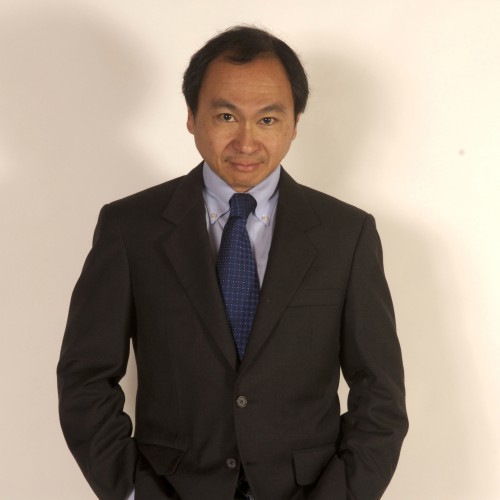Lecture delivered at the IV Encontro Internacional Evoliano, Sao Paulo, Brazil, September 10, 2014.
 Francis Fukuyuma, the Japanese-American intellectual spokesman for the Jewish American Neoconservative movement, proclaimed in his 1992 book The End of History and the Last Man that liberal democracy was the final socio-political form since earlier alternatives such as Fascism and Communism had proven to be ideological failures, and liberty and equality had now been established as universal norms.
Francis Fukuyuma, the Japanese-American intellectual spokesman for the Jewish American Neoconservative movement, proclaimed in his 1992 book The End of History and the Last Man that liberal democracy was the final socio-political form since earlier alternatives such as Fascism and Communism had proven to be ideological failures, and liberty and equality had now been established as universal norms.
Fukuyama’s view of history moving in progressive political phases was of course first popularized in the nineteenth century by German thinkers like Hegel, Marx, and their followers, who sought to discern historiographical patterns in the vagaries of military and economic fortune and to either celebrate or revolt against the current political status of their own nation, in their case Germany.
To be sure, Hegel was somewhat more elevated than Marx in supposing the course of history to be the varying manifestations of a developing Weltgeist, or world-spirit, whereas Marx’s historiography was ruled by mere economic alterations. Nevertheless, the falsehood of even Hegel’s philosophy of history is made clear to anyone who considers the history of the country which is actually promoting liberal democracy now as a universal norm, America.
In America there has been, from its inception as an independent nation, hardly any deviation from liberal democratic goals, and Communism and Fascism have not only been absent there in their European forms but are, if ever they emerge, quickly absorbed into the unchanging liberal democratic framework of the nation. Actually what American society represents is a sort of ahistoric, shadow-communist utopia, where private individuals strive ever more strenuously to possess the means of production and to resist the interference of the state in public affairs. There is little also to distinguish the Communist ideal of equality from the Liberal.
When Fukuyama suggests that we have come to the “end of history,” therefore, what he means is that the world that has undergone genuine historical changes has now been conquered by a country that began and continues as a utopia that is as little capable of historical change as of real progress, that is, progress understood not in the technological but in the traditional sense of the development of the spiritual, intellectual and social attitudes of a people.
The “end of history” is indeed a phenomenon that is peculiar to America as a British colony that has had tenuous connections with the naturally developing history of the Old World. While most countries founded by colonial settlement manage to maintain and develop the culture of their mother nation to a certain extent — as Australia, for example, has done — America began and developed at a time of Protestant and Puritan revolt against the ancient Catholic monarchical traditions of Britain.
It is important therefore to consider the phenomenon of Puritanism which provoked the English Civil War during which America was settled and to notice also the close connection between Christian Puritanism and Judaism. We may recall in this context that the Jews, who had been officially expelled from England in 1290 by Edward I, were allowed by the Puritan dictator Cromwell in the 1650s to return from Holland, where they had been conducting a flourishing financial business, and throughout the Commonwealth the Jews were held in high esteem by the Puritans.
The similarity of the capitalist ethics developed by the Puritans and that of the Jews was noted already in 1911 by the German sociologist Werner Sombart in his work Die Juden und das Wirtschaftsleben. Sombart maintained that the “Protestant” ethic that Max Weber had focused on in his 1905 work, Die protestantische Ethik und der Geist des Kapitalismus, was indeed to be identified specifically as a Puritan one that should be equated to Judaism. For, as Sombart explained, “In both will be found . . . the close relationship between religion and business, the arithmetical conception of sin, and, above all, the rationalization of life.”
With the American Civil War of 1861-65, the last links with monarchical England that had persisted in the pro-English Confederate South were cut by the victory of the Federalist North. Then, in the aftermath of the Civil War, in the late nineteenth and early twentieth century, the Christian religious aspect of the original Puritan work-ethic of the Americans was seriously damaged by the large-scale influx of Jews from Central and Eastern Europe who succeeded in modulating the philo-Semitic Puritan character of American capitalism into a fully Jewish one.
As Sombart pointed out, the Jews had indeed been active in American economic life already from the seventeenth century and had gradually come to monopolize many branches of American commerce such as the wheat, tobacco, and cotton trade. But we must note that with the increased immigration of eastern Jews at the end of the nineteenth century and the promotion of Jewish finance capitalism, what remained of the original Puritan work-ethic and concomitant frugality in the American economy was soon dissipated, while the only vestige of the dissident Puritanical religiosity that survived was its stubborn anti-clericalism.
With the replacement of the Puritan veneration of industry by the parasitical reign of finance, the Jewish tendency to economic utopianism which manifested itself in the twentieth century as totalitarian Communism in Russia, Eastern Europe and the Far East was transformed in the new “promised land” of the Jews into the totalitarian liberalism of the “American Dream.” The capitalism promoted by the Jews steadily strengthened the nation’s commitment to individualistic freedom and material aggrandizement rather than to the civilizational aims of the old monarchies and empires. Such a nation could naturally not evolve or even acquire a human history. Instead of producing examples of human greatness it could only boast of a certain number of tycoons and millionaire entertainers, and instead of historical development it could only experience periodic economic booms and recessions.
Fukuyama himself attempts, in his book, to introduce a Nietzschean question into his glorification of liberal democracy by raising the specter of the “last man,” or the average American-like man whose life is materially sated and spiritually meaningless. But with naïve optimism he maintains that such an intolerably vacuous life will certainly be mastered in a liberal democracy by man’s spiritedness, a human characteristic that will inevitably rebel against such a monotonous existence. This spiritedness is the same as what Plato called the middle part of the tripartite soul, between the rational and the animal parts of it. In Fukuyama’s view, in the liberal democratic system, instead of its reappearance in violent strife, as in the case of nationalist or imperialistic states, there will be an absorption of this passionate energy into sports, business and political shows like election campaigns.
Fukuyama’s belief in such social engineering as liberal democracy universally aims at ignores the vast difference between the states of the Old World and the American. Indeed, the Neoconservative enterprise propagated by Fukuyama serves as a timely reminder of the incompatibility of American with genuinely European systems of political thought. The American social values that are being imposed on Europe and the rest of the world through economic and military means are essentially alien ones and are neither likely to take root easily nor endure. For, unlike the American nation, European and other older nations have a historical vitality that cannot be suffocated by American avarice. In order to illustrate this fact I shall survey here the characteristic political traditions of the Indo-Europeans and the contradictory intellectual movements that have distorted these traditions in the course of modern history.
To understand the traditional Indo-European social ethos, I may begin with the paradigmatic Āryan conception of society discernible in ancient India. The famous ‘caste system’ of the Indians is, unlike the modern western ‘class system’, an entirely spiritual one and men are recognized not by their economic status but by their hereditary spiritual capacity. The four Indian social orders are represented symbolically as the head, arms, thighs and feet of the primordial cosmic anthropomorphic form of the divine Soul. This Cosmic Man, or Purusha, was itself formed, first ideally and then manifestly, through the spiritual desire, the Soul, of the godhead, or the One.
The manifestation of the Soul in Indian religious philosophy is said to be due to its three inherent forms of energy, sattva, rajas and tamas, the first representing pure existence, the second motion and the third inertia (Brahmānda Purāna I,i,3,12). Since there is an intimate and unavoidable correspondence between the macrocosm and the human microcosm, these three energies appear embodied in differing degrees among humans too, the sattvic element most fully in the brāhmans, the rājasic in the warriors or kshatriyas, and the tāmasic in the vaisyas and shudras, particularly the latter. This is the original spiritual and psychological basis of all hierarchy. The brāhman owes his preeminent position in society to his superhuman spiritual power. The name “Brahman” of the deity who represents the Intellectual light of the cosmos, itself derives from a word denoting creative power and it is the privilege and duty of the brāhman to represent this creative power while the kshatriyas, or political rulers and warriors, only serve to maintain this creative power both within the land and also in the universe. The brāhman and kshatriya thus constitute the paradigmatic Indo-European polity centered on the dual organs of what in European politics are called Church and State.
If we turn to the Greek philosophers, we find that in Plato and Aristotle the state is again constantly conceived of in terms of the constitution of the universal and individual soul. According to Plato, the soul is “that which moves itself” (Phaedrus 246a) and is naturally prior to body since it “is what governs all the changes and modifications of bodies” (Laws 892a).
Just as in ancient India, the soul, or psyche, in Plato’s Republic, Bk.IV, is divided into three parts, a higher rational or spiritual part (called logistikon) corresponding to the Indian sattva, a middle passionate one (called thymoeides) correspondng to rajas, and a lower sensual part (called epithymetikon) corresponding to tamas. Since society is as organic a phenomenon as the individuals of which it is composed, in a state too the more the rational aspect predominates over the passionate the closer it approximates to the ideal political form. But the discipline of the lower desires by the dictates of reason is to be found only in a few and these are the “best born and the best educated” men (Republic, IV), whereas the untrained and untamed passions are to be found in abundance among children, women and the lower classes, which form the most numerous section of society. The aristocratic “guardians” of Plato’s ideal republic are therefore required to be true philosophers and will not be drawn from the inferior classes.
Aristotle continues Plato’s spiritually oriented political theory in his Ethica Nichomachea, where he declares that the main aim of politics is the attainment of the good of the nation. The higher classes of a nation will comprise the full citizens who will assume the military and administrative, including priestly, offices of the land. The legislators must govern with a clear knowledge of the spiritual constitution of man, that is, the rational and passionate elements that Plato had discerned in the individual soul. And it is the duty of the legislators to ensure the predominance of the higher aspect of the soul over the lower.
Platonic principles reappear in the European Renaissance in the writings of aristocratic thinkers like Francesco Guicciardini and Jean Bodin. According to Guicciardini — who offered a critique of Machiavelli in one of his works, Considerations on the Discourses of Machiavelli – the chief reason of the superiority of a prince and an aristocracy to the people is that they are not subject to pernicious passions, such as, notably, envy. The French Renaissance philosopher, Jean Bodin — who is notable for his championing of monarchical absolutism — also based his defence of the latter on a similar Platonic basis. For genuine monarchy is, according to him, derived from the Divine Law and the monarch is the earthly image of God. Care should be taken that the religious foundation of the state is never brought into doubt and religious leaders must act as censors of the state in order to maintain moral discipline in it.
It is at this juncture in the history of the world that the revolutionary anti-monarchical ideas of the English Civil War, the American Revolution and the French Revolution appear. If we study the American Bill of Rights of 1789 we realise that it was based largely on the English Bill of Rights of 1689 promulgated by the (originally Puritan) English Parliament after the “Glorious” Protestant Revolution of 1688 in order to curb the powers traditionally invested in the formerly Catholic monarchs of England.
One of the most influential English thinkers of the seventeenth century and one generally considered to be the father of liberal democracy, John Locke, was also a Puritan. Locke was a champion of the separation of the Church and State and had a profound influence on the American ‘Founding Fathers’ such as Thomas Jefferson. The American Bill of Rights, based on the British parliamentarian one, is especially notable for its dissociation (in the First Amendment) of the American state from any official religion. What had begun in England as a rejection of Catholicism was thus turned in America into a rejection of all official religion. Combined with this fear of theocracy was the Puritanical devotion to individual freedom and industry which caused the Americans to view citizenship as a status defined primarily by liberty and citizens as economic units of production not unlike those of the later Communist utopia of Marx.
A little later, in the middle of the eighteenth century, Jean-Jacques Rousseau propagated in France the Lockean conception of government as a social “contract” directed by the “volonté générale” of the people which would reduce the inequalities springing from subservience to the state. However, a robust answer to Rousseau’s doctrine of the “social contract” was offered immediately after the fateful French Revolution by the English political philosopher Edmund Burke in his Reflections on the Revolution in France (1790), where he pointed out that “the state ought not to be considered as nothing better than a partnership agreement in a trade of pepper and coffee, calico or tobacco, or some such low concern . . .”
And since the people cannot be relied upon to follow any “general will” towards the attainment of the good of the nation, Burke proposed a natural aristocracy as the only viable government of a nation. A strong nation is also necessarily a religious one for, as Burke said, all politicians indeed act on behalf of “the one great Master, Author and Founder of society,” namely God.
This vital role of religion in the conduct of states was reiterated in post-revolutionary France too by the French monarchist Count Joseph de Maistre who noted in his “Essai sur les principes generateurs des constitutions politiques et des autres institutions humaines” (1809) that “the duration of empires has always been proportionate to the degree of influence the religious element gained in the political constitution.” Indeed, the truly political laws of a land are synonymous with the religious feelings of the people and the “instant [man] separates himself from God to act alone . . . he does not lose power . . . but his activity is negative and leads only to destruction.” To follow the doctrines of Enlightenment thinkers like Rousseau and Voltaire would thus result in a return to a state of anarchy and degeneracy.
In Germany around the same time philosophers like Kant and Fichte were beginning to point to the crucial significance of the ‘State’ as the means of enforcing an enlightened government. Kant took as his point of departure the excellence of Divine Law in relation to Natural Law, so that Reason, or the Moral Law, was elevated far above the mindless workings of Nature. To establish this rule of the Moral Law on earth, Kant proposed a supremely powerful state that would control all religious and commercial offices in the land.
The leader of the state can never be a democratic representative of the people since democracy inevitably results in a despotism. While Kant favored a monarchical republic, Johann Fichte advocated a Platonic philosopher-statesman who is at once a political and religious leader of his nation. Like a Platonic “guardian,” such a statesman, “in his estimate of mankind looks beyond that which they are in the actual world to that which they are in the Divine Idea . . .” (The Nature of the Scholar, Lecture VIII). The monarch will bear the responsibility of the realization of the inner freedom of the individuals within his nation. It is important to note in this context Fichte’s emphasis that the aim of all society is “ever-increasing ennoblement of the human race, that is, to set it more and more at liberty from the bondage of Nature,” just as the aim of all culture is “to subject Nature . . . to Reason.” In order to counteract the spurious freedom that especially the young hanker after, Fichte insists that a new system of education must be developed which “essentially destroys the freedom of will . . . and produces on the contrary strict necessity in the decisions of the will” (Addresses to the German Nation, Address II).
The state continues to be glorified in the Idealistic philosophy of Hegel, for whom the state, and especially the Prussian state, is the “embodiment of rational freedom realizing and recognizing itself in an objective form” (Lectures on the Philosophy of History). And in the Prussian nationalism of Heinrich von Treitschke, the state is glorified to an extent that it becomes a sort of substitute for God. Treitschke takes care to stress that “the consciousness of national unity is dependent on a common bond of religion, for religious sentiment is one of the fundamental forces of the human character.” (Politics, I) Unfortunately the interference of Jewish elements in German politics had disturbed the traditional spiritual ordering of society by encouraging “the coexistence of several religions within one nationality, involving an irreconcilable and ultimately intolerable difference of outlook upon life.”
Directly opposed to these several statist doctrines of the German Idealists and nationalists is the doctrine of Communism which was propounded in the middle of the nineteenth century by the Jewish political economist Karl Marx. The radical difference between the Marxist view of the world and the Indo-European is already evident in the fact that Marx’s system was based on an atheistic materialism that totally denied the existence of any spiritual reality whatsoever, and all metaphysics in general, in favour of a dialectical socio-economics that attempted to understand the transformations of society according to its changing modes of production. Unlike Hegel who had justified history as the changing manifestations of a quasi-divine world-spirit, Marx wished to ‘create’ history by focusing on what he considered its essential economic activities. As he put it in The German Ideology (Ch.1):
Morality, religion, metaphysics, all the rest of ideology and their corresponding forms of consciousness . . . have no history, no development; but men, developing their material production and their material intercourse, alter, along with their real existence, their thinking and the products of their thinking.
However, the Communist system, for all its apparent evolutionary aspirations, is an anti-scientific, utopian construct aiming at an anti-human classless and stateless society based on the common ownership of the means of production. In this delusional sociological experiment Marx focused especially on class-struggle, or the conflict between capital and labor, as the primary instrument of historical change. By granting economic, social and political equality to all citizens Marx believed that the social awareness and discipline of every individual would naturally be increased. And, while he tolerated a representative parliamentary political system as a transitional stage, his Communist utopia aimed at a final dissolution of the state apparatus (which is what induces hierarchy and inequality) at the most advanced state of Communism, when the people would become fully self-governing.
Marxism is thus the fullest expression of a world-view that is diametrically opposed to the traditional Indo-European ordering of society according to spiritual character which we have observed in ancient India, Greece and the rest of Europe until the advent of philo-Judaic Puritanism in the middle of the seventeenth century. Marxism is naturally also opposed to the state structure that supports the religious and warrior aristocracy that founded, constitute and preserve the nation. It may be noted here that although modern liberal democracies pretend to abhor the Communist ideology, the arrogation of political authority in the West by the legislature and its prime ministerial or presidential leader represents a major step towards the same dissolution of the concepts of state and sovereignty that Communism too strives for.
Marx’s political economic theories were strongly criticized at the turn of the century by many notable German thinkers like Eugen Dühring and Oswald Spengler, but I should like to highlight here one of the most metaphysically structured political philosophical responses to Marxism – namely, the system of the Italian Fascist philosopher, Giovanni Gentile. According to Gentile, the basis of evil, exactly as in Plato and Plotinus, is Matter, or Nature, which is opposed to Spirit and represents as it were, “not merely moral and absolute nullity [but] the impenetrable chaos of brute nature, mechanism, spiritual darkness, falsehood and evil, all the things that man is forever fighting against” (Genesis and Structure of Society).
Gentile points out that the economic life focused on by Marx is marked by a utilitarianism akin to the instinctual life of animals and is a life of slavery to matter, whereas politics should be a means to spiritual freedom. While Marxism aimed at the worst sort of social organization, “the utilitarian, materialistic and hence egoistic conception of life understood as a realm of rights to be vindicated, instead of as an arena of duties to be performed by sacrificing oneself to an ideal,” Gentile’s own ideal of Fascism is based on a metaphysical understanding of society as emerging from a Kantian ideal of a “transcendent society” which is produced by the interaction of the ego and its pure object, the alter ego. It is this conception of a ‘transcendent society’ which makes man a ‘political animal’, as Aristotle had earlier suggested. The gradual self-realization of an individual necessarily entails the enlightenment of his objective counterparts, the other members of society, so that the nation as a whole begins to approach the ideal “transcendent society.”
Indeed, for Gentile, as for Fichte, the proper intellectual activity of the enlightened individual is the comprehension of the whole of mankind or of the Idea of it. And the ‘State’ is the objective embodiment of the personality of the individuals constituting it or the “universal common aspect” of their will. True political liberty is therefore possible only when the individuals that constitute the state become free through the realization of the universal aspect of their personality.
The State in its universal aspect is indeed an image of the Divine Will and the laws of the State must ever be in consonance with the Divine Law. Religion naturally is not an external aid to the will of the state but the constitutive element of it. The prime task of the state is to foster the dual development of individuals and of the society. Gentile’s project of state education is therefore governed by a keen awareness of the essentially moral nature of all education. Those concerned with culture as the self-development of the individuals constituting a state must, he says, be “critical of all knowledge that man does not need for the actual realization of his human nature and for the growth and health of his moral character” (Genesis and Structure of Society). In short, they must be critical of all knowledge that is not genuinely human.
Gentile interestingly also distinguishes between two kinds of treatment of political history. True history is not that which observes the “brute fact” but rather “the inward act of the spirit” always considered from the point of view of the “transcendent state,” the “higher ideal that operates as an end in the actual life of the state” (Ibid.). This transcendent state is indeed the divine model of an earthly state and therefore a constant unchanging norm to which the temporal changes of a state approximate in varying degrees throughout its history.
In this Fascist view of history and of the philosophical significance of the state we finally obtain a corrective to the historiographical errors of Hegelians like Fukuyama who raise the political status quo to an ideal after superficially surveying the external changes of a state as also to the errors of the Marxists who conjure up utopias from these same changes. All of these thinkers ignore the transcendent or divine aspect of statecraft, which, as we have observed in our initial survey of ancient Indian and Greek philosophy, starts with the constitution of the psyche or soul itself and aims, through a sacred kingship or an enlightened autocracy, at the psychological improvement of the individuals that comprise the state. Materialistic societies governed by economically oriented political doctrines, whether Puritan or Marxist, are incapable of any real historical development because the spiritual element of man which alone is capable of movement and development is either poorly understood or wholly dismissed.
Fukuyama’s historiographic thesis is thus merely a description of the abortive state of America itself, which has through its history gradually substituted materialistic and economic principles of statecraft for the spiritual ones that originally governed all European monarchies, including the British. In considering this American problem, we cannot afford to ignore the fateful role that Jewry have played in the history of the West, for the re-entry of the Jews into England during the Puritan revolution is linked, psychologically, to the capitalist career of the new American state just as the Jewish economic utopia of Karl Marx lurks behind the liberal democratic dreams of contemporary Americans. Indeed, all modern political theories that aim at a dissolution of the state or of the leading religious institution of a nation — whether these theories are called Libertarian or Anarchist — must be recognized as derivatives of the defective Jewish economic mentality.
This mentality can, and should, be fully replaced by genuinely Indo-European political doctrines that begin not with contractual promises to the masses of liberty and equality and plenty but rather with the obligations of the leaders of a nation and of the State to actually improve the human psychological condition, or culture, of these masses. Both the State and its leading religious institution — in the case of the West, the Church — must therefore be strengthened in their national role and their alliance must be consolidated. This will naturally entail the exclusion of all anti-statist and anti-clerical elements from national government and education. The philosophical guidelines for the urgently required regeneration of nations are clearly available in the long tradition of European conservative philosophy that I have pointed to and particularly in the most recent example of Gentile. Of course, I am aware that Monarchism, Fascism and the Church are all equally abhorrent to those who today follow Judaized America in its various utopian adventures, but it is well to bear in mind that the price of utopianism is the end of history.






 del.icio.us
del.icio.us
 Digg
Digg

 The Mcdonald’s corporation has over 35,000 restaurants in 118 countries around the world. It is owned by the wealthy Kroc family, who make billions of dollars each year from their fast food empire.
The Mcdonald’s corporation has over 35,000 restaurants in 118 countries around the world. It is owned by the wealthy Kroc family, who make billions of dollars each year from their fast food empire.
